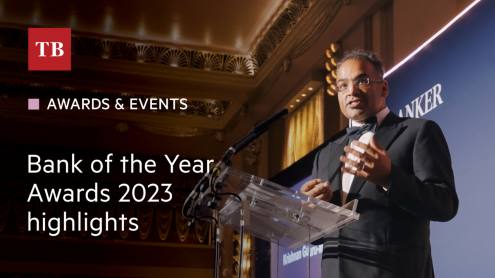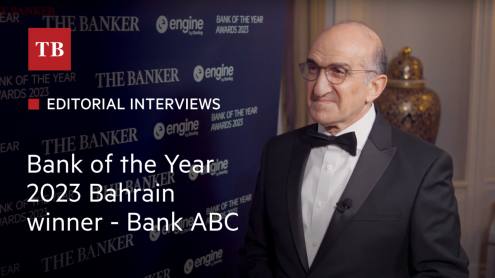Winner: Apama
The judges were highly impressed with Apama’s Trading Strategy Management solution, which allows traders to create, model and test trading strategies within minutes, and to execute them in real time, taking advantage of sub-millisecond detection and response times. Strategies can include a wide range of pre and post-trade analytics, and can operate across all instruments and exchanges. Apama technology is based on more than a decade of research undertaken at Cambridge University, UK, into the problems of analysing data in real time.
Apama has taken a completely different approach to traditional databases and rules engines, and can demonstrate superior response times, scalability and flexibility. Apama launched into the financial services arena with Trading Strategy Management in September 2003 and already has a number of active clients, including JP Morgan and Deutsche Bank.
Highly commended (wholesale): BT Syntegra
BT Syntegra’s ITS.Netrix solution is a new desktop device for the trading floor aimed at revolutionising trader communications. It offers sophisticated telephony functionality, and with built-in computer telephony integration, also alerts users to high-priority incoming instant messages or e-mails, key words appearing in chat rooms, clients accessing particular research on the bank’s website or client orders reaching specified limits.
Highly commended (retail): Intelligent Results
Intelligent Results’ Analytics solution was considered impressive due to its ability to analyse both structured and unstructured data. The mixed-data modelling and scoring application suite is a first in the financial services industry. IR Analytics’ mixed-data models predict customer behaviour 20%-60% better than traditional modelling solutions, offering financial services institutions the opportunity to better predict customer behaviour in collections, recovery and attrition applications, as well as more accurately target accounts with the proper response strategy, and improve customer relationship activities and overall business performance.
Application of the Year
Winner: i-flex solutions
i-flex solutions was selected as the winner in this category for its scalable FLEXCUBE core banking solution and its excellent sales record over the past year, including notching up 47 new clients.
The FLEXCUBE core banking product suite covers retail, consumer, corporate, investment and internet banking, asset management and investor servicing. With its focus on the entire gamut of banking operations (namely cash, trade finance, treasury, securities, derivatives, automated teller operations and other business segments) FLEXCUBE is geared to support multi-bank, multi-currency and multi-channel operations using a widely recognised data model that can incorporate changes in technology and banking standards.
It offers a highly integrated universal banking solution that creates modules that stand alone and integrate on a lean hardware framework, with the ability to support multiple delivery channels and accommodate future innovations.
The solution is highly scalable, as shown by its large and varied customer base. Its parameterisation capabilities mean that there is little need to modify or customise the software code as the business grows. Even more impressive is i-flex’s investment in developing and enhancing the solution; i-flex places a significant accent on R&D with more than 400 people dedicated to new product development. The company recently announced the largest throughput by any applications ever.
i-flex has adapted FLEXCUBE for availability on Linux and plans to move FLEXCUBE on to a complete Oracle 10g stack.
Highly Commended: Infosys Technologies
Also catering to a broad range of clients, Infosys Technologies’ corporate internet banking solution Finacle was a runner-up because of its flexible, scalable and modular e-banking solution, which supports customer access from internet and mobile phone to a comprehensive corporate banking portal, while offering robust security and advanced workflow. The judges felt that both i-flex and Infosys Technologies were successful because they catered for countries that their larger Western competitors have dismissed. The judges also noted the large amounts that both companies are spending on research and development.
Finacle’s business e-banking is a flexible, scalable and modular solution that supports customer access to a comprehensive business banking portal. While offering robust security and advanced workflow, the innovative integrated transaction enabled alerts and web-based cash management makes the solution stand out from its competitors.
ROI of the Year
Winner: Welcome Real Time
Return on Investment (ROI) is a contentious matter at the best of times, and often vendors do not try to assess the ROI or direct measurable benefits to their clients. However, France-based Welcome Real Time clearly takes this seriously and judges were impressed with the detailed analysis and cost and returns figures it gave for its work with Akbank in Turkey, which is using the XLS solution to leverage its EMV (Europay, Mastercard, Visa) infrastructure.
XLS is designed to boost the use of smart payment cards by allowing them to store, process and deliver information on consumers purchasing behaviour. It has been designed to enable banks and merchants to utilise information, made available through EMV infrastructure, as a loyalty tool to increase sales and usage. It enables multiple ‘campaigns’ to be set by the bank or the merchant, to offer rewards according to a customer’s value.
Akbank used XLS to launch Axess, a smart credit card, three years ago. A core feature of Axess is that cardholders can accumulate cash back through their card purchases, which can immediately be redeemed, in whole or part, on new purchases. Merchants can also reward customers with gifts based on prior purchasing behaviour at each outlet.
The aim was to attract new users and merchants and Akbank signed up one million new cardholders in the first eight months and grew at a rate of 42% in 2003 – almost twice as fast as the rest of the market. It reduced cardholder acquisition costs and reported 59% new customers as a result of Axess. The bank also increased its merchant network substantially in the three years of Axess’ availability to the market.
Networking Initiative of the Year
Winner: SMARTS
SMARTS’ InCharge Application Services Manager (ASM) was selected as a winner because it ensures the availability of key business processes by managing applications in relation to the underlying IT network supporting them. It discovers the components of the application’s infrastructure, maps their dependencies and automatically (and instantly) pinpoints the root cause of application degradation wherever it occurs within the IT infrastructure, whether in the network, application, database or any other technology component, at any level.
SMARTS’ InCharge ASM is innovative in the way it performs automated root cause and business impact analysis, and thus offers organisations a way to reduce IT costs by integrating silo management systems into a central console and providing a global view of the application and infrastructure environments.
Winner: Cisco Systems
The judges selected Cisco’s multimedia voice-over IP (MMVoIP) solution, being used by the BT-hosted IP telephony service, because it addresses the topical issues of branch renewal and improving the customer experience. BT MultiMedia VoIP is a hosted IP telephony service that meets rich enterprise telephony requirements. Based on a customised, hosted, Cisco CallManager platform, BT provides customers with centralised connectivity to the PSTN (Public Switched Telephone Network), removing the need for ISDN circuits. A clear advantage is that it enables banks to move from multiple to a single network for a fast return on investment. Convergence also reduces telephony charges, by allowing calls between branches and head offices to run over an IP-VPN (Internet Protocal Virtual Private Network).
Outsourcing Project of the Year
With so much media attention focused on outsourcing, and a number of large contracts signed in the financial services sector, judges were surprised at the lack of entries for this category of IT or business process outsourcing.
Winner: EDS
EDS was selected for being innovative in a fast growing part of the outsourcing marketplace. Its human resources (HR) business process service was provided for Canadian Imperial Bank of Commerce (CIBC). CIBC wanted to improve efficiency and productivity in HR delivery, specifically for its year-end compensation planning cycle which involved the use of multiple systems, including spreadsheets. Using their 30 years of HR business process experience and application development capability, EDS was able to create an e-HR solution that allowed employees and managers direct access to HR transactions., including compensation management.
Using advanced methodologies, EDS designed, developed and tested 40 new processes within a five-month deadline. It conducted accelerated requirements/prototyping workshops with six strategic business units; overlapped design, development and testing; and developed end-user training guides and online application help.
Moving HR services for more than 45,000 active and 9000 retired employees onto a self-service online system in tandem with business process outsourcing has put CIBC well ahead of its competitors in Canada and beyond. The move to full-service capability was completed in September 2003 and the legacy HR system has since been decommissioned.
Award for Special Achievement
Winner: Inmarsat
Keeping in mind the tough environment in Iraq, the judging panel decided to recognise Inmarsat and its service provider e-Go Solutions for their efforts in the development of a new banking network in the war-torn country. Iraq has had no exposure to new technology for more than a decade.
Working with Visa International and e-Go Solutions, Inmarsat’s Regional BGAN satellite modem was used to overcome a non-existent telecoms infrastructure, unreliable power supplies and lack of up-to-date IT systems and software, to establish a banking network within two months. This provided a secure communications network (via Inmarsat’s satellite communications network) for inter-bank communications and to run Visa payments system for three Iraqi banks. The network connects 80 sites throughout Iraq to a secure server in the UK.
The network aims to enable a secure currency and trading backbone for Iraq with the launch of its new currency and to deliver a secure, reliable communications infrastructure to enable the three Iraqi banks to network their branches countrywide for both communication and payments. The network allows Iraqi banks to connect to a global payments system, which is necessary to establishing a stable banking system for the new currency.
No previous installation of this nature or size has been undertaken in the past in the banking sector. It was also crucial that Inmarsat and e-Go Solutions used and trained local engineers in Iraq, to promote the continued development of the country’s networks.






